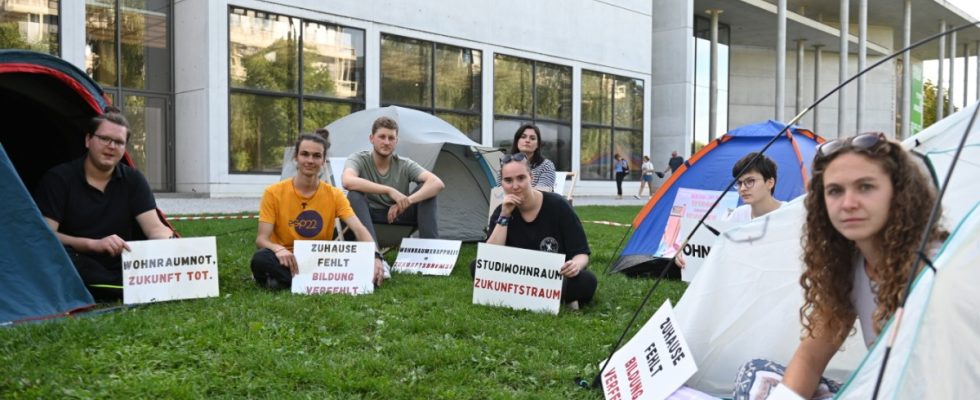A small blue tent, covered with flyers with the inscription “Knowledge needs living”, is already on the lawn in front of the Pinakothek der Moderne on Friday at lunchtime. Behind it there are deck chairs, pavilions and other tents. Banners read: “Making Munich rents possible” or “Living spaces instead of speculators’ dreams.”
Camping as a protest. Because there is far too little affordable living space for them in Munich, students raise the alarm – and demonstratively set up their tents in the middle of the university district for three days. “We’ll have state elections soon,” explains initiator David Vadasz. “With our protest camp at the Pinakothek der Moderne, which lasts until Sunday, we want to push student housing.”
Vadasz is studying political science at the Technical University (TU). At the end of April, he and a few colleagues founded the Housing Working Group, which advocates for more living space for students across universities. “Our model was the mobility working group, to whom we owe the semester ticket today. If you work together, you can achieve something.”
The numbers prove that something has to change. Around 110,000 young people study in Munich and in the surrounding area such as the municipality of Garching. However, there are far too few places in dormitories that could be had for an average of just under 350 euros: according to the student union, there are only around 7,800. And 1,450 of them are empty. The most prominent example is the student town of Freimann, where more than 1,300 residential units are in need of renovation. “The renovation of these apartments, which have been empty for two years, is not even clearly financed,” criticizes Vadasz. Which is why it remains unclear when the already dilapidated houses could be habitable again. 11,497 Munich students are currently waiting for a place in a dorm for three to six semesters. “By the time you’re allowed to move in there, your studies may be long over.”
For many people, the only option left at the moment is to look for accommodation on the open market. But even then they have to be lucky to get anything at all. In the heated housing market, students compete with low earners, seniors with small pensions, refugees and commuters for expensive micro-apartments. “A quick look at relevant portals reveals that rental prices of 800 euros and above have become the norm – an absolutely untenable situation considering the BAföG maximum rate of 934 euros,” says Vadasz.
“When it comes to housing, this excellence remains a waste”
Their demands are therefore clear: housing must remain affordable. And not just in the short term through rapid renovations, but also in the medium and long term. By densifying existing residential complexes, such as those in the student town. But also by building new residential complexes. “On the Garching campus or in Großhadern, for example, there is potential to build new student cities,” says Vadasz. “Up to 25,000 students commute to Garching alone every day.” If they were on site, local public transport would also be relieved. The Ludwig Maximilian University and the TU boasted of their excellence, “but when it comes to housing, this excellence remains wasted.”
The spokesman for the Housing Working Group also complains that the responsible actors are constantly shifting their responsibilities back and forth. The student union complains that the Free State is not giving enough money. In the Ministry of Science they emphasize that the student union acts independently as a “public law institution”. And the Ministry of Construction explains that every new and renovated dormitory place is supported with 40,000 euros. “That’s why we want and must maintain public pressure,” says Vadasz.
With protest, but also with constructive offers. The students are interested in transparent and solution-oriented communication with all stakeholders. That’s why, in addition to the “protest sleep” and a demo through the city on Saturday at 2 p.m., there will also be lectures and panel discussions, workshops on the topic of “housing shortage for young people in Munich” and housing advice.

